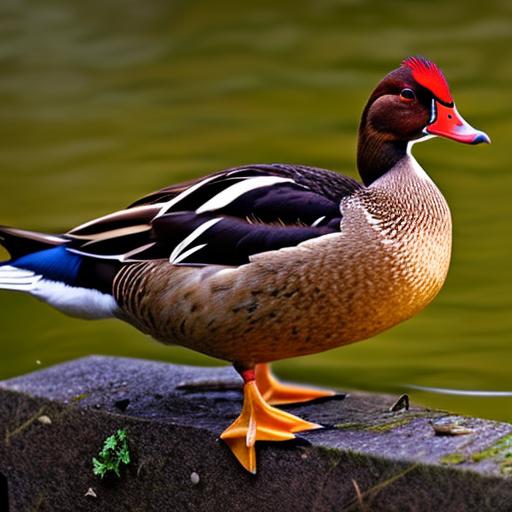Keeping ducks and chickens as pets or for egg production has become increasingly popular in recent years. Both birds offer unique benefits and can be enjoyable additions to a backyard or farm. While ducks and chickens have some similarities, such as their ability to provide fresh eggs, there are also significant differences to consider. In this article, we will explore the differences between ducks and chickens, their housing requirements, advantages of keeping each bird, feeding and watering needs, health concerns, egg production, and coop design. By the end of this article, readers will have a better understanding of whether ducks or chickens are easier to keep based on their individual preferences and circumstances.
Key Takeaways
- Ducks and chickens have different physical and behavioral characteristics.
- Ducks require more space and access to water than chickens.
- Ducks are better foragers and can help control pests in the garden.
- Chickens are easier to handle and require less maintenance than ducks.
- Proper feeding and watering is essential for the health of both ducks and chickens.
Differences between Ducks and Chickens
Ducks and chickens differ in various ways, including their physical characteristics and behaviors. Physically, ducks are generally larger than chickens and have a more rounded shape. They have webbed feet that are designed for swimming, while chickens have claws that are adapted for scratching the ground. Ducks also have waterproof feathers that help them stay buoyant in water, while chickens have feathers that are not as water-resistant.
In terms of behavior, ducks are known for their love of water. They enjoy swimming and splashing around in ponds or pools. Chickens, on the other hand, prefer to scratch the ground in search of food. Ducks are more social animals and tend to form close bonds with their flock mates. Chickens can also be social but are generally less dependent on social interaction.
Housing Requirements for Ducks and Chickens
Both ducks and chickens require appropriate housing to ensure their safety and well-being. The basic housing needs for both birds include shelter from predators and the elements, adequate space to move around, and nesting boxes for laying eggs.
Ducks have specific requirements when it comes to housing. They need access to water for swimming and cleaning themselves. This can be provided through a small pond or a shallow pool within their enclosure. Ducks also need a sheltered area where they can rest and sleep, as well as nesting boxes for laying eggs. The shelter should be well-ventilated and protected from drafts.
Chickens, on the other hand, do not require access to water for swimming but still need a clean and dry environment. They need a coop that provides protection from predators and the elements. The coop should have roosting bars for chickens to perch on at night, as well as nesting boxes for laying eggs. Chickens also benefit from having an outdoor run where they can scratch and forage.
Advantages of Keeping Ducks over Chickens
Keeping ducks has several advantages over keeping chickens. One of the main advantages is that ducks are generally quieter than chickens. While chickens can be noisy, especially when they are laying eggs or feeling threatened, ducks have a softer quack that is less likely to disturb neighbors.
Ducks are also hardier in cold weather compared to chickens. Their waterproof feathers provide insulation and protect them from the cold. Chickens, on the other hand, may require additional heat sources during winter months to stay warm.
Another advantage of keeping ducks is that they are excellent foragers. They will eat insects, slugs, and other pests in the garden, reducing the need for chemical pesticides. Ducks also produce nutrient-rich manure that can be used as fertilizer.
Advantages of Keeping Chickens over Ducks
While ducks have their advantages, there are also benefits to keeping chickens. One of the main advantages is that chickens lay more eggs compared to ducks. On average, a chicken can lay around 250-300 eggs per year, while a duck may lay around 150-200 eggs per year. If egg production is a priority, chickens may be the better choice.
Chickens are also easier to find feed and supplies for compared to ducks. Chicken feed is readily available at most feed stores and can be easily purchased online. Ducks, on the other hand, may require specialized feed that is formulated for waterfowl. Finding duck feed may be more challenging, especially in areas where ducks are less common.
Chickens can also be enjoyable pets and provide entertainment with their quirky behaviors. They are known for their curious nature and can be trained to do tricks or respond to commands. Chickens are also more likely to interact with their owners and enjoy being held or petted.
Feeding and Watering Ducks and Chickens

Both ducks and chickens have specific dietary needs that should be met to ensure their health and productivity. Ducks require a balanced diet that includes a commercial waterfowl feed or a poultry feed specifically formulated for ducks. They also benefit from supplements such as crushed oyster shells for calcium and fresh greens for added nutrients. Treats such as mealworms or fruits can be given in moderation.
Chickens, on the other hand, can be fed a commercial poultry feed that is formulated for layers. This feed contains the necessary nutrients for egg production. Chickens also benefit from supplements such as crushed oyster shells for calcium and grit to aid in digestion. Treats such as kitchen scraps or mealworms can be given as well.
In terms of watering, both ducks and chickens require access to clean and fresh water at all times. Ducks need water deep enough to submerge their bills in order to clean their nostrils and eyes. This can be provided through a waterer or a shallow pool within their enclosure. Chickens can drink from a traditional waterer or a nipple waterer, which helps keep the water clean.
Health Concerns for Ducks and Chickens
Both ducks and chickens are susceptible to certain health issues that owners should be aware of. Common health concerns for both birds include parasites such as mites or lice, respiratory infections, and diseases such as avian influenza or Marek’s disease.
To prevent these health issues, it is important to keep the coop clean and dry, provide proper nutrition, and practice good biosecurity measures. Regularly inspecting the birds for signs of parasites and promptly treating any infections or diseases is also crucial. Consultation with a veterinarian who specializes in poultry health is recommended for proper diagnosis and treatment.
Egg Production of Ducks and Chickens
When it comes to egg production, there are differences between ducks and chickens. Chickens are known for their consistent egg-laying behavior, with most breeds laying an egg almost every day. The size of chicken eggs is also relatively consistent, with variations depending on the breed.
Ducks, on the other hand, have a more irregular egg-laying pattern. Some breeds may lay eggs almost every day during their peak season, while others may lay fewer eggs. The size of duck eggs is generally larger compared to chicken eggs, and they have a richer taste.
Duck and Chicken Coop Design
The design of the coop for ducks and chickens should take into consideration their specific needs. For ducks, the coop should have a sheltered area where they can rest and sleep, as well as nesting boxes for laying eggs. It should also have access to water for swimming and cleaning. The coop should be well-ventilated and protected from drafts.
For chickens, the coop should provide protection from predators and the elements. It should have roosting bars for chickens to perch on at night, as well as nesting boxes for laying eggs. Chickens also benefit from having an outdoor run where they can scratch and forage.
Coop designs can vary depending on individual preferences and available space. There are many resources available online that provide detailed plans and instructions for building coops suitable for both ducks and chickens.
Which is Easier to Keep, Ducks or Chickens?
In conclusion, the answer to whether ducks or chickens are easier to keep depends on individual preferences and circumstances. Ducks have the advantage of being quieter, hardier in cold weather, and better foragers. They can also be enjoyable pets and provide nutrient-rich manure for gardening. Chickens, on the other hand, lay more eggs, are easier to find feed and supplies for, and can be entertaining pets. Ultimately, it is important for potential owners to consider their own needs and research further before deciding which bird to keep. Both ducks and chickens can bring joy and fresh eggs to a backyard or farm setting.
If you’re considering keeping ducks instead of chickens, you may be wondering about the differences in care and maintenance. While both ducks and chickens require proper housing and care, ducks have some unique needs that may make them easier to keep in certain situations. According to a helpful article on Poultry Wizard, one important consideration is providing adequate heat for your coop during colder months. To learn more about how to keep your chicken coop warm and cozy, check out their informative guide on heating options for a chicken coop.
FAQs
What are the differences between ducks and chickens?
Ducks are waterfowl while chickens are land birds. Ducks have webbed feet and waterproof feathers, while chickens have scaly feet and non-waterproof feathers. Ducks are also more social and enjoy being in groups, while chickens are more independent.
Are ducks easier to keep than chickens?
It depends on the individual’s preferences and circumstances. Ducks require more water and a larger area to swim, while chickens can be kept in a smaller space. Ducks also produce more waste and require more maintenance of their water source. However, ducks are generally hardier and more resistant to diseases than chickens.
What do ducks eat?
Ducks are omnivores and eat a variety of foods, including insects, snails, worms, fish, and plants. They can be fed a commercial duck feed or a mix of grains, vegetables, and protein sources.
What do chickens eat?
Chickens are omnivores and eat a variety of foods, including insects, worms, seeds, and grains. They can be fed a commercial chicken feed or a mix of grains, vegetables, and protein sources.
Do ducks need a pond?
While ducks enjoy swimming and need access to water to keep their feathers clean and healthy, they do not necessarily need a pond. A shallow pool or tub can suffice, as long as it is cleaned regularly and the water is changed frequently.
Do chickens need a coop?
Yes, chickens need a coop to roost in at night and to lay their eggs. The coop should be secure from predators and provide adequate ventilation and space for the number of chickens being kept.
Meet Walter, the feathered-friend fanatic of Florida! Nestled in the sunshine state, Walter struts through life with his feathered companions, clucking his way to happiness. With a coop that’s fancier than a five-star hotel, he’s the Don Juan of the chicken world. When he’s not teaching his hens to do the cha-cha, you’ll find him in a heated debate with his prized rooster, Sir Clucks-a-Lot. Walter’s poultry passion is no yolk; he’s the sunny-side-up guy you never knew you needed in your flock of friends!







